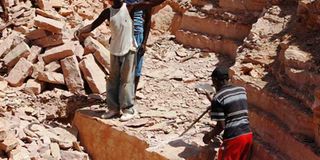Premium
Mandera quarry attack survivors sow new seeds of hope

Stone miners at the Bur Abor quarry in Neboi Location, Mandera County. About 40 Mandera terror victims from Nyeri county have relocated back home and changed careers from quarry work to farming. PHOTO | MANASE OTSIALO | NATION MEDIA GROUP
What you need to know:
- Most of the terror attack survivors sustained bullet wounds and are unable to do hard labour like they did before. Farming, they say, requires less physical effort.
- Recently, they approached local youth chairman Richard Waithaka for ideas on the economic activities they could engage in.
- During the visit, all the survivors were gainfully employed, none straining harder than their frail body would allow.
- As a team, they steadfastly harvested the seeds in a one acre piece of land given out by Mr Waithaka.
About 40 Mandera terror victims from Nyeri county have relocated back home and changed careers from quarry work to farming.
Most of them sustained bullet wounds and are unable to do hard labour like they did before. Farming, they say, requires less physical effort.
On July 7 last year, Al-Shabaab militants overran Soko la Mbuzi estate in Mandera County and sprayed bullets on quarry workers there.
The victims were mostly from Kieni constituency - attracted to Mandera by the higher daily wage for quarry workers.
“In Mandera, workers are paid more than in Kieni. Besides, Kieni quarries are dangerous as one has to dig deeper to get the raw materials,” says Mr Justus Maina, a survivor.
Some victims escaped death by a whisker, while others were unscathed.
All of them, however, cannot contemplate going back to Mandera.
And the wounded are physically unable to carry out hard tasks, with some still under medication.
FARMING ALTERNATIVE
Recently, they approached local youth chairman Richard Waithaka for ideas on the economic activities they could engage in.
“We did not want to end up desperate and dependent. We had to put the past behind us and face the future with courage,” says Mr Maina.
Mr Waithaka, a zoology and botany graduate said in an interview: “Seeking greener pastures in Mandera had turned sour; their hopes were shattered by radical militants. I sought to revive their broken dreams.”
He decided to start fodder farming for them. “Some are limping while others walk while leaning backwards due to bullet wounds.
Fodder farming requires less labour but fetches more money,” he said, noting that he would help them raise more funds and obtain special medical treatment at selected hospitals.
When the Sunday Nation visited the survivors, they were harvesting seeds of boma rhodes grass - used in hay production - which they had planted just before the October rains.
“It’s an easier task; the seeds germinate seven days after planting. The grass is then left to grow for two months, culminating in a good harvest,” Mr Waithaka said.
GAINFULLY EMPLOYED
During the visit, all the survivors were gainfully employed, none straining harder than their frail body would allow.
As a team, they steadfastly harvested the seeds in a one acre piece of land given out by Mr Waithaka.
“We had to stop relying on quarry work for a livelihood. It had placed our lives in danger,” Mr Maina said.
Hay production, according to them, is a good way out. It requires less energy than quarrying.
Mr Waithaka says fodder farming is golden business. “One can either sell the seeds harvested, use them to produce hay, or even start dairy farming since one will have enough feed for cattle,” he said.
At the moment, the seeds that the terror survivors harvest are not for sale. “We want to gather as many seeds as possible and then secure our own land for commercial farming,” said Mr Maina.
He added that the land they are currently on was provided by Mr Waithaka for training purposes.
“Once we get someone who will lease us land, our lives are bound to change for the better. We plan to make a tidy sum of money and eventually buy our own land,” said Mr David Mungai, a survivor.
They have urged the government to chip in and help them.




